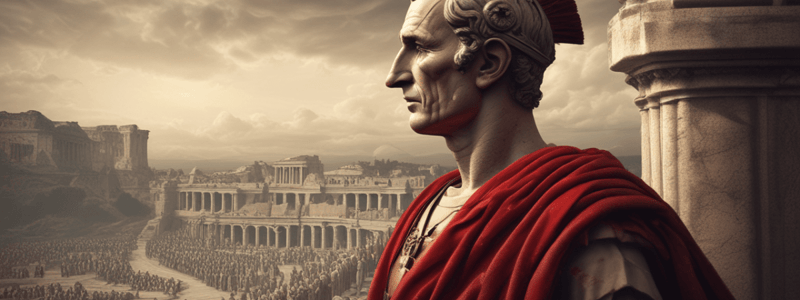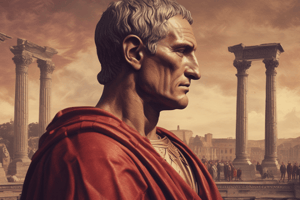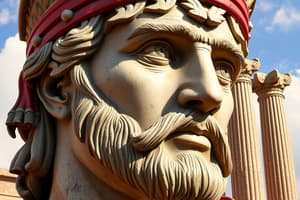Podcast
Questions and Answers
What was the primary role of the Assemblies in the Roman Republic?
What was the primary role of the Assemblies in the Roman Republic?
- To elect the Consuls
- To advise the Senate on legislation
- To hold significant power and make most legislative decisions
- To have the final say in legislation (correct)
What was one of the main motivations behind the assassination of Julius Caesar?
What was one of the main motivations behind the assassination of Julius Caesar?
- Disagreement over Caesar's military strategy
- Resentment of Caesar's modest lifestyle and lack of ambition
- Fear of Caesar's growing power and perceived threat to the Republic (correct)
- Personal grievances towards Caesar's family
What was one of Pompey's early campaigns?
What was one of Pompey's early campaigns?
- Conquest of Gaul
- Battle of Pharsalus
- Defeat of pirates in the Mediterranean (correct)
- Invasion of Egypt
What was the result of Caesar's crossing the Rubicon River with his legions?
What was the result of Caesar's crossing the Rubicon River with his legions?
What was the position held by Julius Caesar in 69 BCE?
What was the position held by Julius Caesar in 69 BCE?
What was the name of the group that favored the power of the Assemblies in the Roman Republic?
What was the name of the group that favored the power of the Assemblies in the Roman Republic?
Study Notes
Roman Republic Politics
- The Roman Republic was governed by the Senate and the Assemblies
- The Senate held significant power, but the Assemblies had the final say in legislation
- The Roman Republic was divided into three groups:
- Optimates: Conservative and aristocratic, favored the Senate's power
- Populares: Progressive and democratic, favored the Assemblies' power
- Equites: Businessmen and knights, sought to increase their influence
Assassination of Caesar
- Julius Caesar was assassinated on the Ides of March (March 15) in 44 BCE
- Conspirators included Brutus, Cassius, and over 60 senators
- Motivations:
- Fear of Caesar's growing power and perceived threat to the Republic
- Resentment of Caesar's accumulation of power and disregard for the Senate
- Personal grievances and rivalry
Pompey's Campaigns
- Pompey the Great was a renowned general and statesman
- Early campaigns:
- Defeated pirates in the Mediterranean (67 BCE)
- Conquered Jerusalem and incorporated Judea into the Roman Empire (63 BCE)
- Later campaigns:
- Defeated Mithridates VI of Pontus (61 BCE)
- Returned to Rome, celebrated a triumph, and became a member of the First Triumvirate
Caesar's Rise to Power
- Julius Caesar's early career:
- Quaestor in 69 BCE
- Aedile in 65 BCE
- Praetor in 62 BCE
- Caesar's rise to power:
- Formed the First Triumvirate with Pompey and Crassus (60 BCE)
- Governor of Cisalpine Gaul and Illyricum (58 BCE)
- Conquered Gaul (modern-day France and Belgium) from 58 to 51 BCE
- Crossed the Rubicon River with his legions, starting a civil war against Pompey (49 BCE)
Studying That Suits You
Use AI to generate personalized quizzes and flashcards to suit your learning preferences.
Description
Test your knowledge of the Roman Republic's governance, factions, and the events leading up to Caesar's assassination.




